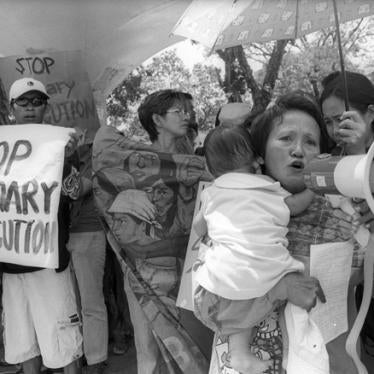(New York) - Philippine President Gloria Macapagal Arroyo should immediately and unambiguously acknowledge the existence of a death squad responsible for killing hundreds of suspected criminals and street children in Davao City, and condemn such murders, Human Rights Watch said today. Arroyo should order the Philippine National Police headquarters and the National Bureau of Investigation to conduct a prompt and thorough investigation into the killings.
In its April 6, 2009, report, "You Can Die Any Time: Death Squad Killings in Mindanao," Human Rights Watch concluded that police officers and local government officials were involved or complicit in the decade-old killing spree that has plagued Davao City. Similar "death squads" have been reported in General Santos City, Digos City, and Tagum City in Mindanao, and in Cebu City, the Philippines' second-largest metropolis.
"In the face of evidence pointing to local government involvement in these murders, President Arroyo's continued silence could be seen as tacit acceptance of death squad killings," said Elaine Pearson, deputy Asia director at Human Rights Watch. "If she is serious about shutting down the death squads, now is the time for her to speak out, press for prosecutions, and announce measures to help victims' families."
While Human Rights Watch welcomes the public statements by the Philippine National Police (PNP) ordering investigations into the killings, the continued involvement of local police as well as the unwillingness to acknowledge that some state officials are complicit in the killings undermines the credibility of their investigations.
Since the release of the Human Rights Watch report, various government institutions have announced that they would investigate the death squads. The Commission on Human Rights followed up a public hearing about the subject in Davao City in March by announcing an investigation. The chairperson, Leila De Lima, said the commission would pursue its investigation into the killings "for as long as it takes," with another round of hearings set for the second week of May. On April 20, 2009, the Office of the Ombudsman, an independent government agency that investigates and prosecutes criminal acts by government officials, told reporters that it also would initiate investigations into the killings.
The PNP chief, Director General Jesus Verzosa, and the Davao City Police Office (DCPO) senior superintendent, Ramon Apolinario, have each announced an investigation. In a statement released on April 7, Verzosa "ordered an intensified investigation and intelligence gathering to track down persons or groups responsible for the killing of suspected criminals" and directed the Southern Mindanao regional police director, Chief Superintendent Pedro Tango, "to gather evidence and file charges against suspects involved in these killings."
According to an April 20 article by the Philippine Star, Chief Superintendent Tango instructed police chiefs to contact witnesses mentioned in the Human Rights Watch report to pursue cases against those involved in the killings.
Human Rights Watch said that, while there should be genuine efforts to investigate death squad killings, the apparent involvement of local police in the "Davao Death Squad" makes them unsuitable for such an investigation. The PNP should ensure that officers charged with any investigation do not intimidate, harass, or threaten families of victims or witnesses, or force them to testify against their will. Witnesses have legitimate reasons to mistrust and even fear local police. Instead, such an investigation requires the direct involvement of authorities at the national level, such as the police headquarters in Manila or the National Bureau of Investigation. On April 8, Davao City Police Chief Apolinario told journalists that if the allegations in "You Can Die Any Time" are true, then the entire PNP, and not only the Davao City police, should investigate.
In "You Can Die Any Time," Human Rights Watch recommended that the PNP conduct thorough investigations into the killings; open channels of communication to receive information anonymously; and investigate the alleged participation and complicity of police officers, including officials who fail to rigorously investigate cases.
Human Rights Watch also recommended that the authorities carry out measures for witnesses to offer testimony safely, for example by using videotaped testimonies and closed courtrooms. They should also establish a witness protection program that is safeguarded by an agency other than the police, as well as enable witnesses to change identity, transfer to new locations - including to other provinces - pending trial and, if necessary, after trial.
"It is difficult to believe that the local police can properly investigate these killings while denying the very existence of a death squad in the city," said Pearson, "President Arroyo should heed the Davao City police chief's advice and direct the police and other investigatory bodies in Manila to take over this crucial investigation."







